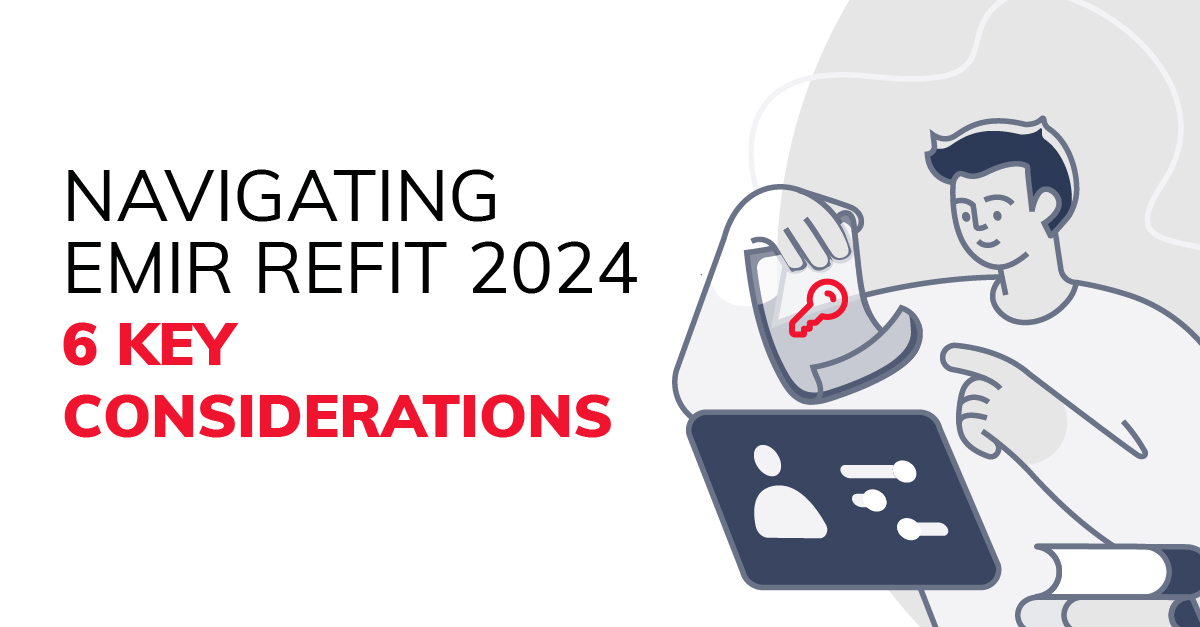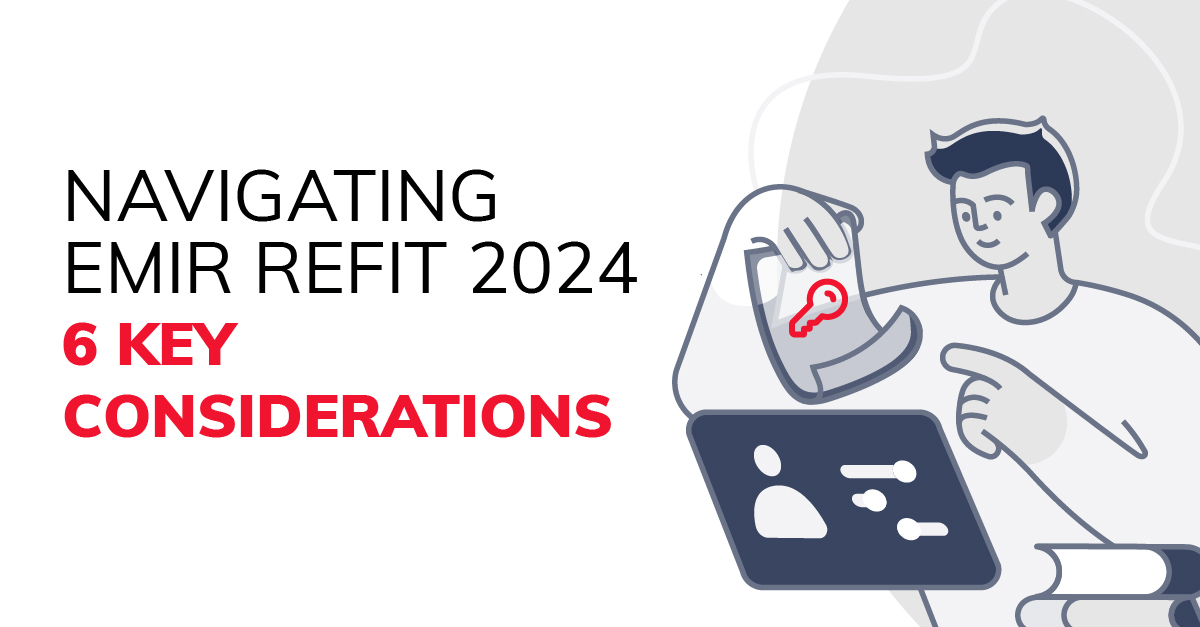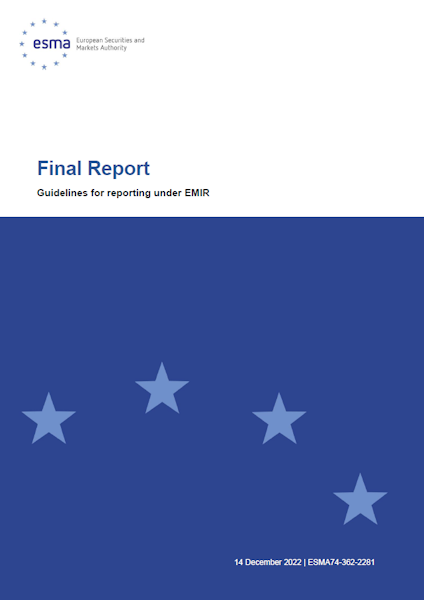

The European Market Infrastructure Regulation (EMIR) Refit, set to come into effect on 29th April 2024, introduces several changes. In December of last year, ESMA released the final report on guidelines for reporting under EMIR Refit, marking a pivotal moment in the realm of financial regulation:
The primary objectives for EMIR Refit are:
- Enhance transparency: EMIR Refit aims to bolster transparency in the derivatives market. This is achieved through stricter reporting requirements, making it easier for regulators to monitor and assess systemic risk.
- Simplify reporting: One of the significant changes in EMIR Refit is the simplification of reporting requirements. It reduces the administrative burden on market participants, while still ensuring that the necessary data is captured.
- Improve data quality: EMIR Refit emphasizes the importance of high-quality, accurate data reporting. The revised framework includes guidelines for data validation and reconciliation, ensuring the integrity of information submitted.
As financial institutions and market participants prepare for these changes, there are key considerations to keep in mind. This article outlines six critical aspects to focus on for successful navigation of the EMIR Refit 2024.
- Understanding the Scope and Applicability: The first step is to thoroughly understand the scope of EMIR Refit. It applies to financial and non-financial counterparties engaged in derivative transactions, including banks, investment firms, insurance companies, pension funds, and corporates. Entities must assess whether they fall under the regulation and to what extent, considering their size, nature of activities, and the types of derivatives they use.
- Enhanced Reporting Obligations: EMIR Refit emphasizes improved transparency through enhanced reporting obligations. Counterparties will be required to report additional details about derivative contracts to trade repositories. Understanding these requirements and ensuring the availability of relevant data is crucial. Institutions should update their reporting systems and processes to comply with these enhanced standards.
- Risk Management and Clearing Obligations: The regulation introduces changes to risk management and clearing obligations, especially for non-financial counterparties. Entities must review their existing risk management policies and clearing arrangements. They should also evaluate the need for potential adjustments to ensure compliance with the new thresholds and requirements for mandatory clearing and margin rules.
- Impact on Cross-Border Transactions: EMIR Refit has implications for cross-border derivative transactions, particularly in relation to third-country entities. Firms engaging in derivatives trading with partners outside the EU should understand the new rules on equivalence and cooperation arrangements. They must ensure that their transactions with non-EU counterparties comply with EMIR standards.
- Upgrading Technology and Infrastructure: To effectively manage the increased reporting and risk management demands, upgrading technology and infrastructure is essential. Firms should invest in robust IT systems capable of handling the additional data requirements and risk calculations. This includes integrating new software solutions, enhancing data quality, and ensuring system interoperability.
- Training and Awareness: Lastly, training and awareness are critical for seamless adaptation to EMIR Refit. Organizations should conduct training programs for their staff to understand the new regulatory landscape. This encompasses familiarizing employees with the changes in reporting, clearing, risk management practices, and the implications for day-to-day operations.
ESMA plays a pivotal role in guiding market participants on how to comply with the new EMIR Refit reporting requirements. The final report on guidelines for reporting under EMIR Refit released by ESMA provides comprehensive insights into the new reporting landscape.
The guidelines cover a wide range of topics, including data validation, reconciliation, and the use of Legal Entity Identifiers (LEIs). Market participants are expected to:
- Implement robust data validation processes to identify and correct errors before reporting to trade repositories.
- Undertake data reconciliation to ensure consistency between the data reported by counterparties.
- Use LEIs to accurately identify the entities involved in a transaction.
- Use UPIs to accurately identify various asset types - specified by the ANNA DSB.
- Ensure that their reporting systems align with the new data fields introduced by EMIR Refit.
Market participants are advised to thoroughly review these guidelines and adapt their reporting processes accordingly. Additionally, ESMA emphasizes the importance of cooperation between national competent authorities and market participants to ensure a smooth transition to EMIR Refit.
In conclusion, EMIR Refit did not change the fundamental objectives of EMIR but aimed to improve and refine certain provisions to make the regulation more efficient, reduce the administrative burden, and better tailor the requirements to different types of market participants.
By focusing on these six key considerations, institutions can ensure they are well-prepared for the upcoming changes and can continue their operations in compliance with the new regulatory framework. As the financial landscape continues to evolve, staying informed and adaptable is imperative for the sustained success and resilience of market participants.
Are you fit for EMIR Refit?
Fund Recs, in collaboration with Aquest, are hosting a limited number of workshops with Fund Management Companies to assess their readiness for EMIR Refit in relation to their oversight obligations.
The program will be delivered by Daniel Lawlor from Aquest and SME's from Fund Recs. Daniel has 20 years’ experience in the funds industry as a funds lawyer and financial regulator, where he was the Head of Fund Policy at the Central Bank of Ireland.
Daniel will be joined by members of the Fund Recs team, who have built an industry leading solution for EMIR Reconcilation and Oversight.
If you work for a Fund Management Company and are interested in setting up a no-obligation workshop, please complete the form and one of the team will be in touch.

 https://www.esma.europa.eu/sites/default/files/library/esma74-362-2281_final_report_guidelines_emir_refit.pdf.
https://www.esma.europa.eu/sites/default/files/library/esma74-362-2281_final_report_guidelines_emir_refit.pdf. 

